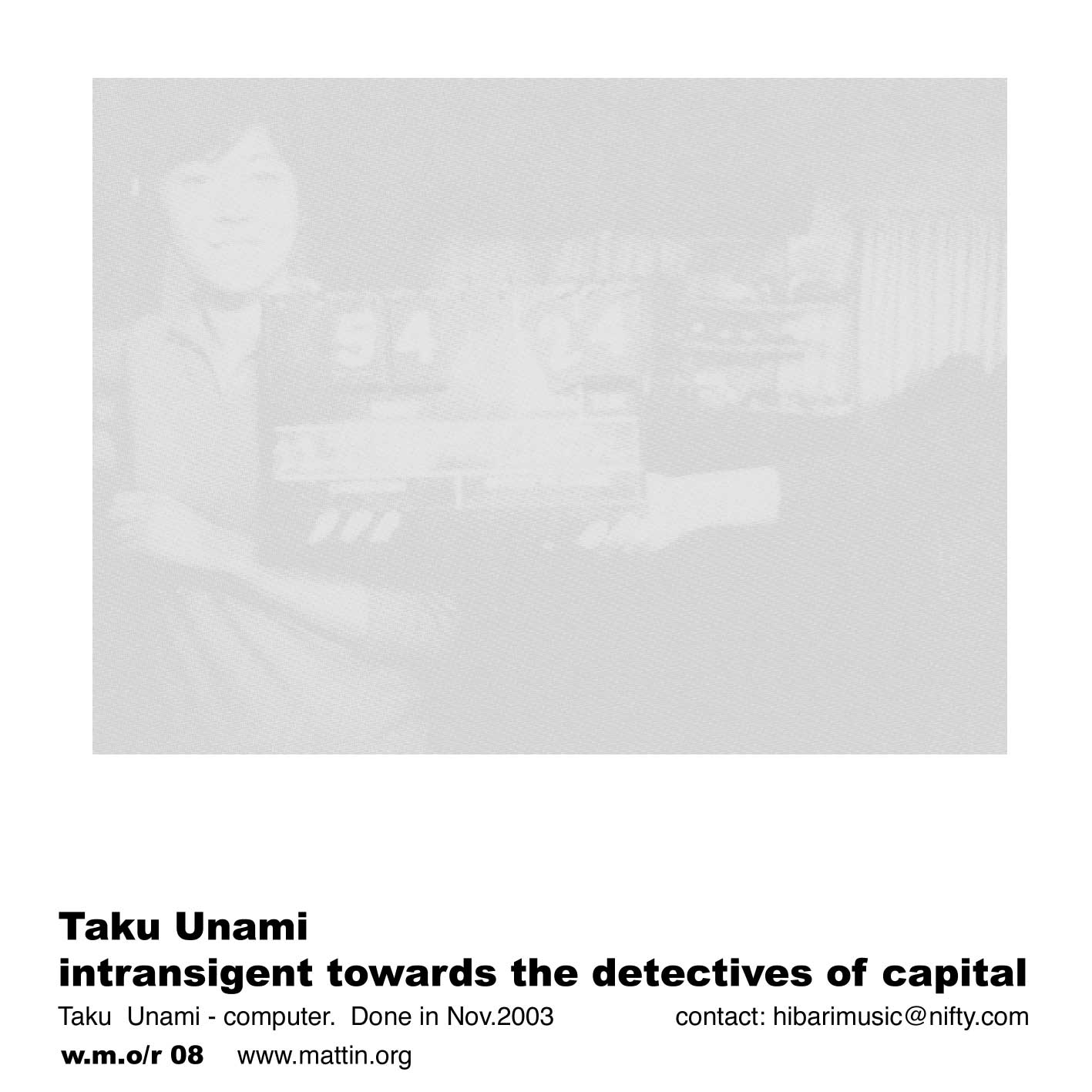
Improvised Music from Japan
In a full-lenght album on the label run by
Basque laptop player Mattin, the sounds of objects were mixed with thir
own feedback noises, and the laptop was "performed" in the strict sense
of the word. Unami has been influenced by Mattin's music, characterized
by the feedback between the laptop's intrinsic noises and its built-in
microphone, the "performance' of the rotation noises of the fan, noises
from scratching the body with the fingernails, and so on. This approach
to the laptop as an acoustic/electric instrument separate from DTM
software led to Unami to give dynamic performance that were clearly
different from sound installations.
============
VITAL WEEKLY
============
number 407
------------
week 4
------------
TAKU UNAMI - INTRANSIGENT TOWARDS THE DETECTIVES OF CAPITAL (CDR by W.M.O/R)
I have no idea who Taku Unami is, but on this limited CDR he is
credited for playing 'computer'. While this being a release by
W.M.O/R, the label of Basque native Mattin, I assume there would be a
lot of computerized noise on this release. But it starts out with a
lot of silent stuff. For seconds and seconds nothing seem to be
happening, and then occassionally there is a few sounds. Slowly this
piece builts up over the next half hour as more and more sounds drop
in and at one point they start dropping out again. There are moments
when maybe two or three sounds can be heard, which are the most
active bits here. It's hard to tell which are the sound sources Unami
uses, because the sound is highly fragmented. The second and final
piece uses the same sort of structure as the first piece, but here
the sounds are louder, of course when they do sound at all. This not
an easy work of music, and might be best compared to Taku Sugimoto:
what he does on the guitar, this guy does on the computer. If you
like silent music, here is your thing. (FdW)
A limited
release CD-R, this latest dispatch from the enigmatic Taku Unami is
fittingly released on laptop troublemaker Mattin’s imprint. Long
associated with Tokyo’s contemporary improvising scene, and having
honed his own aesthetic in the city’s ultra-quiet Off-Site
improvisation meetings, Unami has released several provocative
recordings on his own Hibari label (where he’s played guitar and
electronics alike). On this oddly-named release, he contributes two
long tracks on computer alone, each pregnant with very long silences.
As is customary with this scene, microscopic sounds and a nearly
Feldmanian attention to space are key indicators of the path taken (and
of those not taken, of course). On the first piece, Unami lingers long
on sounds akin to muted cymbals – in between long stretches of space,
the occasional metallic splash interjects. The music thus isn’t
declamatory or showy in any way (it’s reserved even by this idiom’s
standards), nor is it laminal (in the AMM sense), dedicated to the slow
accretion and reduction of sound. Unami isn’t concerned about dynamic
arcs or anything of the sort, but seems content simply to make each
gesture and non-gesture atomistic and self-referential. With extreme
patience, he coaxes the music into a somewhat busier space, allowing
glimmers of dialogism (a glitch responding to a thud, etc.) to emerge
and slowly ceding them into a drone-based construct.
The second piece features more percussive sounds. There is variety in
the noises Unami summons, and he is more willing to use long tones on
this piece, but the overall intent is still to avoid compositional
logic or patterns. There may be a thud as something is dropped on the
floor of the neighbors’ apartment, a brief hiss of steam from the
ventilator, or the slow whirr of an appliance, but that’s as close as
you get to an “event” or an “idea.” This is simply a soundtrack for the
late nights alone in your room, listening to the world around you. It’s
probably less Cagean than that sounds, but like a lot of the most
provocative creations to come out of Tokyo of late, Unami seems happy
to approach music as a way of posing perceptual problems than via any
concern for its content. Here the question is whether decontextualized
fragments or remains stripped of all references and freed from
narrative flow can constitute anything akin to a form. Is that even
important? Or is it inevitable that we impose form on it during our
listening? Thankfully, Unami’s improvisations are also pleasant to
listen to, even if they are radically stripped down.
auf abwegen #34 (Cologne)
Der Japaner Taku Unami hat im Nobember 2003 eine Festplattenkomposition mit unmoglichem Titel (s.o.) fertiggestellt, auf der auber einiger Schlurf- und Knirschgerauschen nur ein gewisses Grundrauschen zu horen ist. Kopfshmerzambient in Reinform. Yves
DiskUnion (Japan)
宇波拓の使う楽器は色々ある。ギター、バンジョー、さらにはウィーンの伝統楽器コントラ・ギター…、弦楽器を中心にその興味は つきないようだ。コンピュー ターの使用もその一つに数えられる。ところが、このコンピューターの使用方法が実にひねくれている。コンピューターにはスピーカーが接続されているが、こ れからは可聴できる音が聞こえてこない。宇波はこのスピーカーのコーン紙の上にいろいろなオブジェを乗せ、スピーカーを振動させることにより発せられる、 オブジェの振動音を演奏に用いる。なんたる原始的な響き!! 例えば、ザビエール・シャルルも演奏に振動音を用いるが、その響きはシリアスでゾクゾクする カッコ良さがある。ところが宇波はいささかコミカルだ。「ポコ」 とか「チン!」 とか…。漫画的だと思う。しかし、これが深い沈黙に放たれると未知なる 恐怖へのアイコンと変貌する。せまり来る何か…、正体のわからぬモノへの恐怖…。この作品でも、宇波の得たいの知れない「何か」 をあちらこちらで感じる ことが出来ると思う。